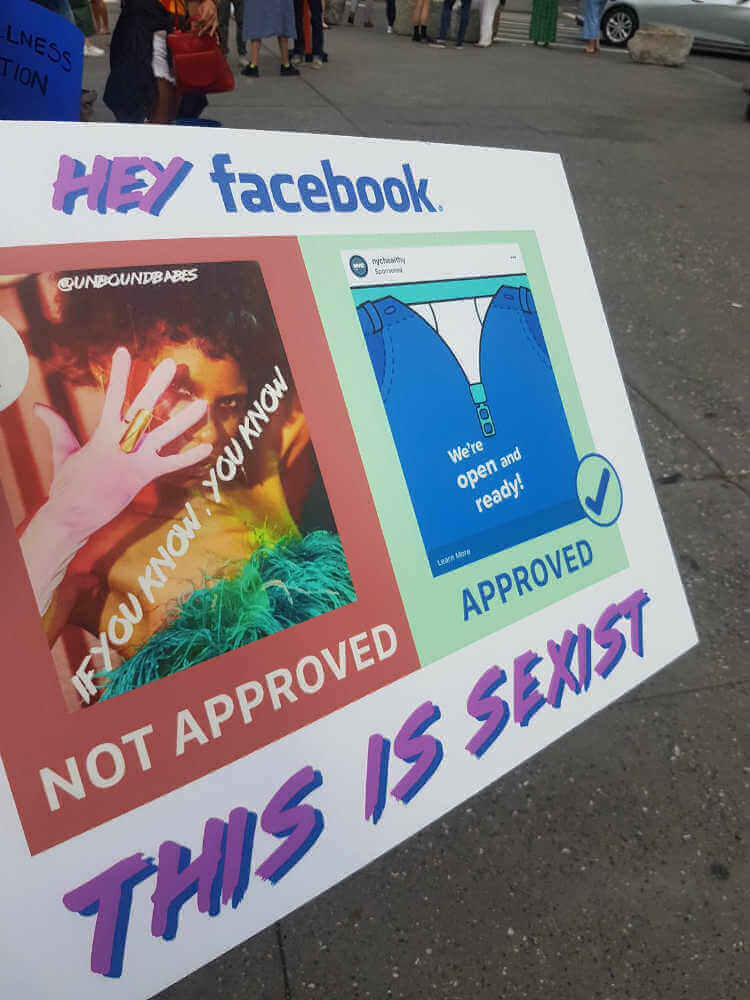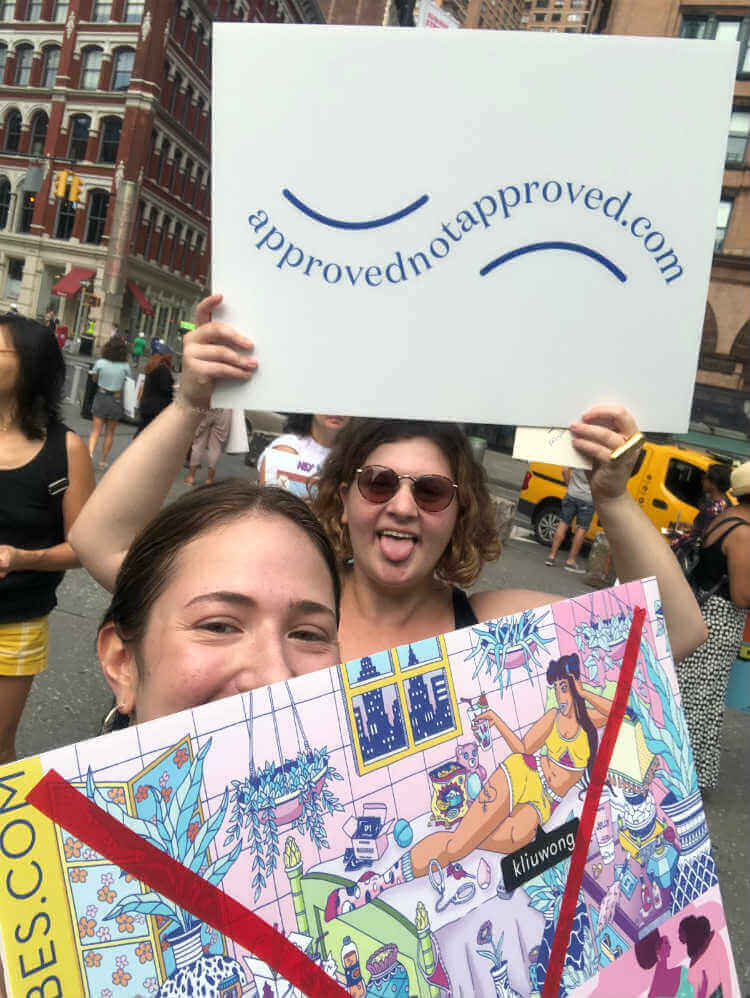‘Approved, Not Approved’ Protests Blatant Sexism Against Women’s Sex Tech Advertising
Two female-led sex tech companies lead the fight for equality.

Why is it, with 2020 right around the corner and so many ground-breaking technological innovations happening practically every day, are we still having to wage so many battles for the basic right for women to be treated fairly?
This disregard for equality is especially glaring when the women involved own and operate businesses that are all about a woman’s right to sexual pleasure.
Sexism on the subway
Case in point, an alarming example of this clear bias that recently came up in New York.
The story first begins with Unbound, a female-owned and operated sex tech company, that wanted to place ads for their products with the Metropolitan Transportation Authority (MTA), which oversees buses, trains, and subways throughout the New York area.
According to the New York Times, at first Outfront Media, which handles ad placement for the MTA, was more than willing to work with Unbound on its ads.
Hearing of this potentially positive development for sex tech companies, Dame, founded and operated by Janet Lieberman and Alex Fine, also approached Outfront Media to possibly get ads placed.
Then things took a turn for the worst.
After more than a few back and forths with the agency over potential ads, Dame received an email claiming the MTA was revising its advertising guidelines: the upshot is that they would not, at all, accept an ad“that promotes a ‘sexually oriented business,’ and advertisements for sex toys or devices for any gender fall within this category.”

But what about Unbound? Well, the news there wasn’t much better. After the MTA publicly said it would work with them to get ads approved, the MTA began to demand Unbound make change after change.
The breaking point for Unbound was the MTA’s clear and obvious hypocrisy, especially in light of its willingness to allow sexually evocative ads for other products and services.
A ridiculous double standard
Speaking to Vice, Polly Rodriguez, Unbound’s CEO and co-founder said of the situation:
Because of their unwillingness to change the policies and the ridiculous double standard regarding phallic imagery (see: Hims ads), we did not move forward and the ads we submitted were never approved.
Insult to injury, and further evidence that the decision not to allow the ads was purely sexist is that the mentioned Hims ads—dealing with erectile dysfunction—had no problem getting approved.
Dame, meanwhile, received their own letter from the MTA that did nothing but add fuel to the fire.
In a different Vice article, Alex Fine from that company reported that she’d been forwarded a letter addressed to Outfront from MTA’s Chief
Development Officer, John Lieber, stating:
After a careful review, the MTA determined that the proposed ads promote a sexually oriented business, which has long been prohibited by the MTA’s advertising standards.

Fine further pointed out that these decisions were clearly sexist, a telling sign that everyone she dealt with at the MTA were men: “The MTA platform favors male-run organizations that tackle sexual health with a male-centered lens,” she further told Vice.
But after all this, there is actually some good news. No, the MTA didn’t do the right thing and become a responsible and inclusive business but their laughably obvious sexism did do one right thing: they rightfully pissed off some very determined women.
#DerailSexism
Dame and Unbound did not take the situation with the MTA laying down. First, Dame sued the MTA—publicizing the suit with the #DerailSexism hashtag on their social media.
As noted by another New York Times article, their suit and Alex Fine’s statement about it and the situation, became a powerful call to arms against this kind of biased behavior on the part of advertisers:

What we allow in advertising validates certain scripts and devalues others. When Facebook or the MTA allow erectile dysfunction medication to advertise, they are saying ‘this is a necessary product that you should feel entitled to.’ On the contrary, when they ban our ads, or Unbound’s, we are subtly encouraging sex, but not pleasurable sex. Most people don’t know that advertisements are censored, that the people who have dedicated their lives to improving sex are being silenced. If we can’t tell you that sex is supposed to pleasurable… who will? I think this ad regulations build the container for larger issues, including sexual discrimination and harassment.
Fine further points out the financial ramifications of the MTA’s bias, asking in the suit to be reimbursed for money used on the campaign and, more importantly, a clear explanation from the MTA for their actions.
We’re a female-owned, majority-minority company […] contributing to New York’s tax base while employing women and minorities in STEM positions. A great deal of time and money was spent responding and bending to your direct feedback […] If your agency claims to help the small business women of the Empire State, then we would love to understand your reasoning behind this exhausti[ng] and abortive review process.
Approved, Not Approved
But Dame and Unbound were far from done with this issue—not by a longshot.
Partnering up, they created Approved, Not Approved: an interactive site that calls attention to advertising’s double standard by asking viewers to view a series of real and potential ads and try to guess which ones were, you guessed it, approved or not approved.
While deceptively simple, the site is, in reality, a powerful statement: each image is shown with the frustrating explanation of why or why not each ad was allowed to run, perfectly highlighting that there are no real guidelines or consistency behind any of them—aside from their sexism and bias against female sexuality.
Calling out Facebook
But Unbound and Dame aren’t just going after the MTA. Another well-deserved target is the social media monster that’s Facebook; with their own accepted and rejected ads appearing on the “approved, not approved” site to show that this problem is hardly limited to just one company.
Part of their activism also included bringing their “approved, not approved” message to the streets of New York, where they asked Gothamites to play their game, resulting in many people being clearly outraged by the bias taking place.
They also recently brought their message to the front door of Facebook itself, their protest launching these sex tech entrepreneurs further into the spotlight.
Talking to Business Insider, Alex Fine said of Dame that they’ve “proven that people are interested in what we’ve created, yet this third variable, these advertising platforms … have impacted the business. They have a bias towards sexuality in general, and then more specifically to female sexuality.”
Polly Rodriguez of Unbound echoed this, adding that the issue is larger than the financial ramifications in that Facebook needs to step up and do the right thing:
MeToo took place in a big way on their platform. They have a moral responsibility to take action on that movement and figure out how they can team with voices in these communities to allow users to engage in the counter narrative.
Where from here?

Meanwhile, Facebook and the MTA have stayed silent on the issue, which is practically an admission that they will continue to remain part of the problem: continuing to drag back sexual equality and the right to female pleasure through their silence.
Fine and Rodriguez’s are being far from quiet, however. “Approved Not Approved” is still going strong, their battle with sex and female bias in adverting placement being covered by many more major news outlets.
That this is still an issue shows that, despite our technological advancements, we have a long, long way to go before our sense of social responsibility catches up.
And if we ever do get there it will be through the power and dedication of women like Fine and Rodriguez, plus the other innovative women-founded and run sex tech businesses out there, who continue to fight for what’s right—and equal.
Image sources: Unbound, Approved, Not Approved
Leave a reply
You must be logged in to post a comment.

















